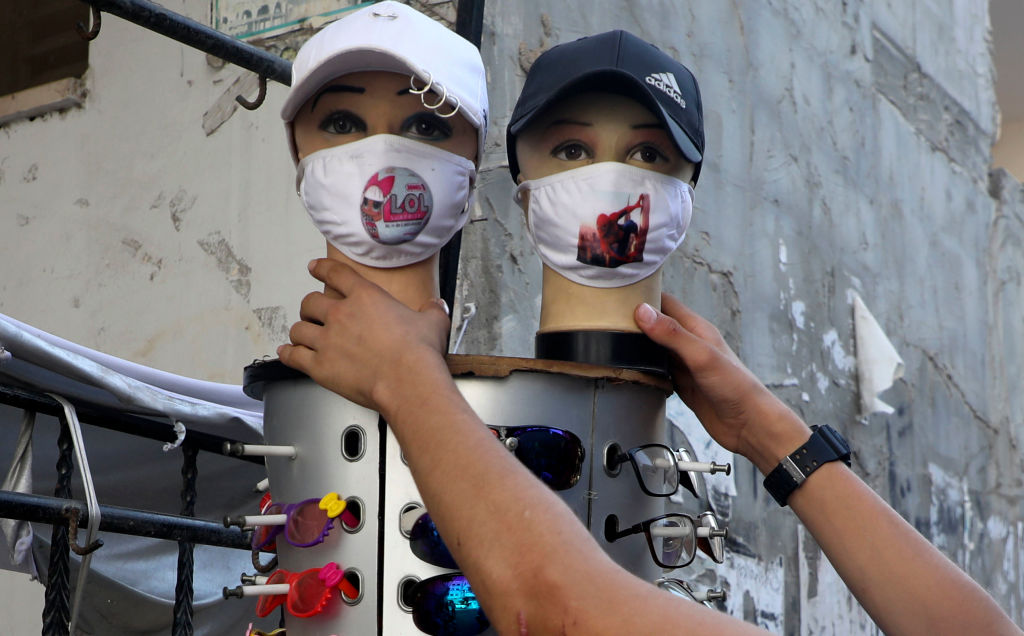Do face masks act as a crude coronavirus proto-vaccine? Some researchers think it's possible.


A free daily email with the biggest news stories of the day – and the best features from TheWeek.com
You are now subscribed
Your newsletter sign-up was successful
Even if a coronavirus vaccine is approved on an emergency use basis this year, it wouldn't be available for the general public until mid-2021, two industry vaccine experts tell The Washington Post. And that's if everything goes right. But a group of researchers suggested in a New England Journal of Medicine commentary Tuesday that face masks might stand in as a crude substitute until a vaccine is available.
The unproven theory "is inspired by the age-old concept of variolation, the deliberate exposure to a pathogen to generate a protective immune response," The New York Times reports. Before the smallpox vaccine, for example, some doctors would rub smallpox scabs or pus on healthy people to stimulate a more mild case and an immune response to protect against re-infection. With COVID-19, the speculation is that a mask cuts down on the number of viruses that enter a person's airway, and if a small number slip through or around the mask, it may prompt strong and enduring immunity.
There is some research on hamsters and observational studies of humans that lend credence to the ideas that masks block out just enough virus to encourage mild or asymptomatic infections, and that such low-grade infections spark a protective immune response. But trying to prove the theory of masks as proto-vaccine through clinical trials would be unethical, the Times reports.
The Week
Escape your echo chamber. Get the facts behind the news, plus analysis from multiple perspectives.

Sign up for The Week's Free Newsletters
From our morning news briefing to a weekly Good News Newsletter, get the best of The Week delivered directly to your inbox.
From our morning news briefing to a weekly Good News Newsletter, get the best of The Week delivered directly to your inbox.
Some infectious disease experts told the Times they are skeptical masks would even work in that way, and all of the researchers warned against trying to intentionally infect yourself with small amounts of the coronavirus. "People definitely got smallpox and died from variolation," notes Columbia University virologist Angela Rasmussen. But Dr. Monica Gandhi, an infectious disease doctor at U.C. San Francisco and coauthor of the NEJM commentary, said people should wear masks anyway, so "why not drive up the possibility of not getting sick and having some immunity while we're waiting for the vaccine?"
A free daily email with the biggest news stories of the day – and the best features from TheWeek.com
Peter has worked as a news and culture writer and editor at The Week since the site's launch in 2008. He covers politics, world affairs, religion and cultural currents. His journalism career began as a copy editor at a financial newswire and has included editorial positions at The New York Times Magazine, Facts on File, and Oregon State University.
-
 Local elections 2026: where are they and who is expected to win?
Local elections 2026: where are they and who is expected to win?The Explainer Labour is braced for heavy losses and U-turn on postponing some council elections hasn’t helped the party’s prospects
-
 6 of the world’s most accessible destinations
6 of the world’s most accessible destinationsThe Week Recommends Experience all of Berlin, Singapore and Sydney
-
 How the FCC’s ‘equal time’ rule works
How the FCC’s ‘equal time’ rule worksIn the Spotlight The law is at the heart of the Colbert-CBS conflict
-
 TikTok secures deal to remain in US
TikTok secures deal to remain in USSpeed Read ByteDance will form a US version of the popular video-sharing platform
-
 Unemployment rate ticks up amid fall job losses
Unemployment rate ticks up amid fall job lossesSpeed Read Data released by the Commerce Department indicates ‘one of the weakest American labor markets in years’
-
 US mints final penny after 232-year run
US mints final penny after 232-year runSpeed Read Production of the one-cent coin has ended
-
 Warner Bros. explores sale amid Paramount bids
Warner Bros. explores sale amid Paramount bidsSpeed Read The media giant, home to HBO and DC Studios, has received interest from multiple buying parties
-
 Gold tops $4K per ounce, signaling financial unease
Gold tops $4K per ounce, signaling financial uneaseSpeed Read Investors are worried about President Donald Trump’s trade war
-
 Electronic Arts to go private in record $55B deal
Electronic Arts to go private in record $55B dealspeed read The video game giant is behind ‘The Sims’ and ‘Madden NFL’
-
 New York court tosses Trump's $500M fraud fine
New York court tosses Trump's $500M fraud fineSpeed Read A divided appeals court threw out a hefty penalty against President Trump for fraudulently inflating his wealth
-
 Trump said to seek government stake in Intel
Trump said to seek government stake in IntelSpeed Read The president and Intel CEO Lip-Bu Tan reportedly discussed the proposal at a recent meeting
